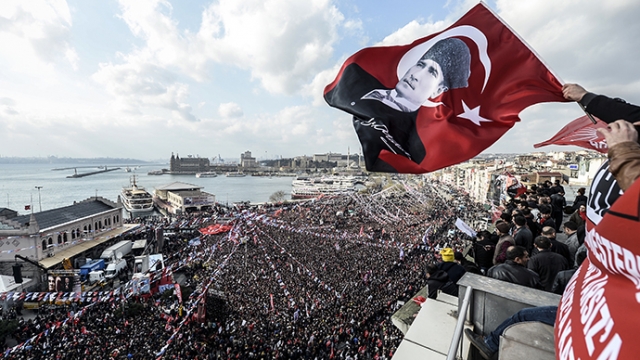Turkish Elections: AKP, Erdogan Take Hit
The Turkish people have spoken. Last Sunday’s parliamentary elections saw 86 percent of eligible voters come to the polls in what many have called a turning point for the country. While the significance for Turkey is obvious, the message sent by voters is less clear.
The Justice and Development Party (AKP), which had held a majority for 13 years, led all contestants by taking 258 seats in the country’s 550-seat parliament. However, it no longer holds the strong grip it has had on the government for more than a decade.
Since 2002 supporters of AKP and its muscular leader Recep Tayyip Erdogan have felt empowered by the party’s advocacy of Islamist values and appeal to Turkish nationalism. The AKP’s opponents on the other hand – who tend to be urban, educated, and liberal – view the party and Erdogan as authoritarian, ambivalent to European values, and hostile to the country’s Kemalist secular traditions.
Sunday’s parliamentary elections showed that AKP’s position is still strong but significantly diminished. The party’s 258 seats are significantly smaller than the 327 it won in the last general election in 2011. It now faces two choices: attempt to rule through a minority government, or form a coalition with one or more of the country’s other parties.
Pro-Kurdish Party Makes Inroads
One group vowing not to enter any coalition with AKP is the People’s Democratic Party (HDP). Often characterized as liberal and pro-Kurdish, the HDP won 79 seats by representing the country’s Kurdish minority as well as liberal, urban, ethnic Turks. The party took 13 percent of votes and 79 seats, becoming the first pro-Kurdish party ever to enter the legislature.
Whereas AKP and other parties such as the Nationalist Movement Party (MHP) hew to a conservative, nationalistic line, the HDP appealed to voters through a message of inclusion.
“The reason the HDP has won this many votes is because it has not excluded any members of this country, unlike our current rulers,” said one young party supporter. “It has embraced all languages, all ethnicities and members of all faiths and promised them freedom.”
Chances for Snap Election
The AKP could reach out to the MHP or the Kemalist Republican People’s Party (CHP), the main opposition party with 132 seats, to form a coalition. But if it finds itself unable to do so, the ensuing instability could play into its favor. Failure to form a government within 45 days gives President Erdogan the right to call for a snap election, one in which AKP could regain an outright majority.
Both the HDP and MHP won roughly 80 seats but came in slightly above the 10 percent threshold for holding seats in parliament. If one or both are shut out in a snap election, their seats would be distributed among the other parties. Such an outcome would most likely propel the AKP back into a majority. “We expect a minority government and an early election,” one AKP official told Reuters.
While that sounds tantalizing for AKP, it is unlikely, according to Sinan Ulgen of the Istanbul-based Center for Economic and Foreign Policy Studies. He expects a coalition: “Fundamentally, I don’t think this will be a protracted period of instability, essentially because the opposition parties are hungry for power.”
Result Shines Darkly on Erdogan
President Erdogan did not stand for office in this election. It has been widely framed as a referendum on his personal rule, however, with his critics hailing it as a triumph for democracy and a rejection of his cult of personality.
Erdogan chose his words carefully: “Our nation’s opinion is above everything else. I believe the results, which do not give the opportunity to any party to form a single-party government, will be assessed healthily and realistically by every other party.”
He remains powerful, with a presidential term lasting until 2019 and an office buttressed by a largely loyal civil service. But AKP’s failure to form a majority means it won’t be able to further amend the Turkish constitution, stymying efforts to transfer more power to the presidency.
Erdogan remains the country’s top dog, but commented Istanbul academic Soli Ozel, “whether he will be able to determine events, I doubt it.”
Joseph Larsen












